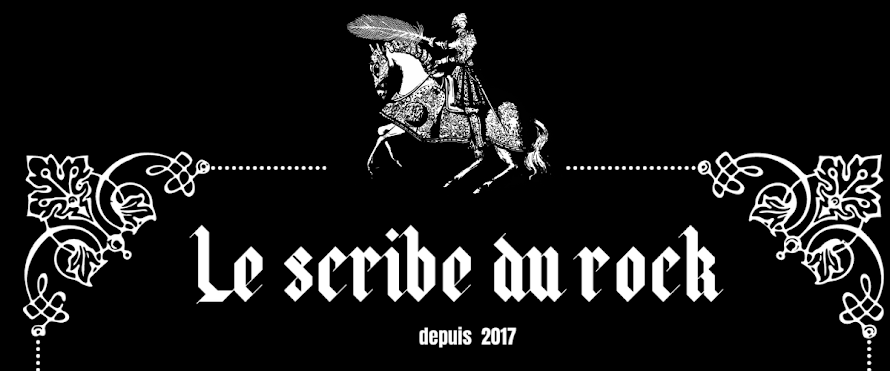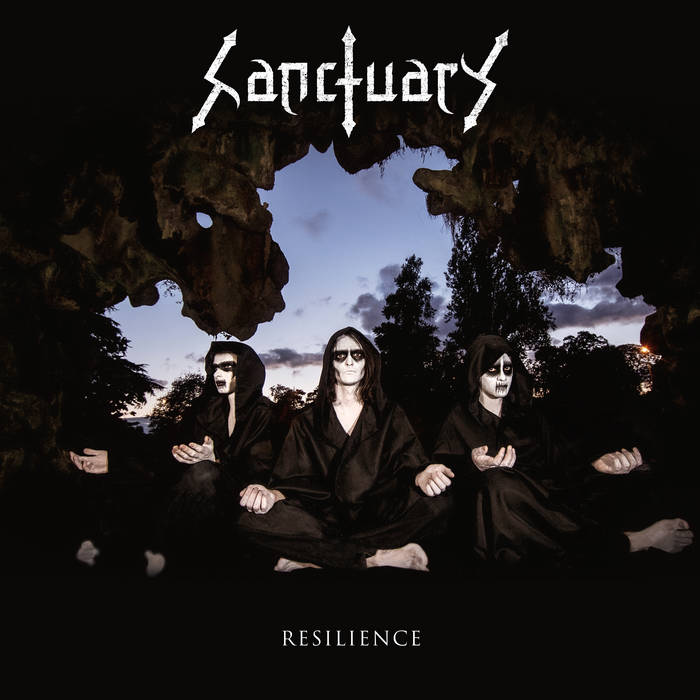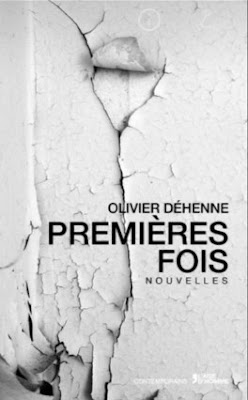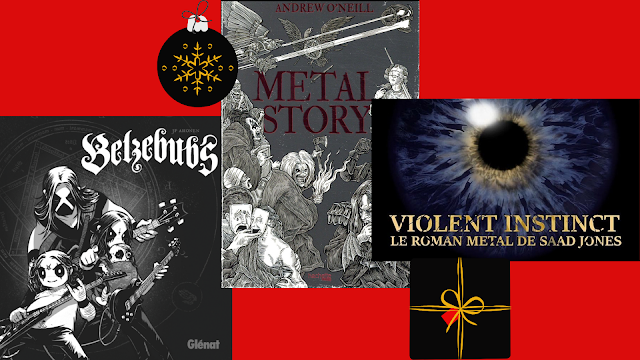Mental Battlefield ! Interview avec/with Sanctuary - Symphonic blackened death metal - French + English Text - Ellie Promotion - Le Scribe du Rock
Bonjour Sanctuary ! Bienvenue dans le Scribe du Rock ! Pouvez-vous vous présenter à nos lecteurs ?
Antoine : Sanctuary a été créé en 2006 par 3 frères : François (clavier) et Julien (batterie) et moi-même Antoine (guitare/chant). Nous avons embauché notre cousin à la basse, rendant le projet 100% familial à ses débuts. Nous nous sommes lancés dans l’écriture d’une musique qu’on qualifierait de black metal symphonique (inspirée Dimmu Borgir, Children of Bodom, Cradle of Filth). Nous avons connu plusieurs changements de line-up, notamment à la basse, pour finalement embaucher Sonny (actuel bassiste du groupe) en 2013. C’est à partir de cette année que nous avons décidé de mettre un coup d’accélérateur, car en effet, jusque-là, nous n’avions rien sorti, mais seulement fait des concerts. En 2016, nous avons publié un premier EP Beyond The Divine, suivi d’un premier album en 2018, Le Choix Du Mal. Cette même année, François a quitté le groupe, ce qui a marqué un tournant important dans notre histoire. Nous avons eu un nouveau claviériste pendant un an, mais nous sommes désormais une formation à 3, notre claviériste actuel, Axel, étant un membre de session.
Vous sortez votre nouvel album « Resilience » a la fin du mois (NdS : de Novembre 2020, mois de cet échange)...J'ai eu la chance de l'écouter et de le chroniquer. Pouvez vous nous parler de la réalisation de cet album ?
Antoine : L’écriture de Resilience s’est pas mal étalée dans le temps. Certains morceaux datent déjà un peu et ont été joués sur scène à plusieurs reprises ("Mental Battlefield" et "Rise of The Unpossessed Self" notamment), tandis que d’autres sont beaucoup plus récents (la composition de I, The Resilient s’est terminée début 2020). Le processus de composition a été impacté par l’évolution du groupe lui-même, à savoir le départ de François en 2018. Une partie de l’album a été composée avec lui. Suite à son départ, je suis devenu le compositeur principal, mais Julien a commencé à apporter une contribution plus importante aux morceaux. Début 2020, l’album était prêt à être enregistré, on a profité du premier confinement pour être bien au point sur nos partitions respectives. Nous avons enregistré entre fin mai et fin juin. Le mix et le mastering ont eu lieu en juillet/août. Cela a été relativement efficace, malgré les nombreuses pistes. Pendant ce temps, nous nous sommes occupés du shooting photo et de la réalisation de l’artwork. Et la campagne de com’ a démarré en septembre. Donc on aura réussi à pondre un album entre deux confinements, remplissant l’objectif qu’on s’était donné de sortir l’album cette année !
Sanctuary : 1, Covid : 0
Musicalement vous naviguez entre death metal, black metal symphonique mais vous avez aussi des éléments plus « progressifs » qui peuvent rappeler certaines œuvres d'Opeth...Pouvez vous nous parler de vos influences, de ces groupes qui furent (et sont encore) déterminants pour vous ?
Antoine : Nos influences sont nombreuses et variées, mais il y a effectivement des artistes déterminants. A nos débuts, les principaux étaient Children of Bodom (Alexi Laiho a été mon guitariste préféré pendant longtemps), Dimmu Borgir (c’est toujours une influence), et dans une moindre mesure Cradle Of Filth et Anorexia Nervosa. Mais rapidement, d’autres influences se sont ajoutées, notamment parce que Julien et moi, quand nous jammions ensemble, ne jouions pas tellement du black, mais des styles plus rythmés/groovy que je qualifie moi-même de très “guitaristiques” : Metallica, Slayer, Pantera, Lamb of God ont donc constitué des influences importantes dans notre jeu guitare/batterie. Puis, d’autres artistes sont venus enrichir notre approche de la composition. En premier lieu : Carach Angren, Behemoth et Opeth (très touché que tu y fasses référence, donc !), notamment pour l’aspect harmonique, et Gojira, Meshuggah, Hacride ou même Gorod pour l’aspect rythmique. Nous allons également piocher des idées musicales chez des artistes non metal. Quelques exemples : Tigran Hamasyan (jazz), Ez3kiel (electro/rock), Chinese Man, The Prodigy (electro)... Pas mal de groupes français dans tout ça !
Il se dégage de « résilience » quelque chose de plus positif que ce que l'on peut d'habitude entendre dans ce style musical. C'est une forme de voyage pour un individu au travers de diverses épreuves de la vie mais il en sort vainqueur à la fin, c'est ça ? Pouvez vous nous en dire plus sur les textes et la thématique ?
Antoine : Oui, en effet, il y a cette idée là. Dans le premier morceau, "At The Gates of Dementia", le protagoniste constate qu’il va très mal et que les choses ne peuvent durer ainsi, à moins de sombrer dans la folie. Il choisit de se battre contre les démons qui l’habitent. Tout l’album raconte ce combat, les victoires/espoirs et les rechutes/égarements, qui se passent le tour à chaque morceau, sauf à la fin. Si on suit la logique, le dernier morceau devrait constituer une énième rechute. Mais ce n’est pas le cas. Après, "I, The Resilient", qui semble affirmer que le combat contre les démons est gagné, "Where The Man Shines" (Là où l’Homme resplendit) constitue une ouverture vers un état de plénitude, de paix intérieure. Mais il s’agit surtout d’un idéal (peut-être utopique) à atteindre, une sorte d’absolu. François m’avait dit un jour : “la conclusion de "Where The Man Shines", c’est comme la toupie à la fin du film Inception”. Le plan tourne en rond (sur un accord 7, donc tendu, suspendu), et s’arrête d’un coup, sans qu’on sache vraiment comment tout cela se termine. Si notre musique était mise en image, il y aurait probablement un “to be continued…” qui s’afficherait à l’écran après le tout dernier coup de caisse claire de l’album.
Sur la pochette vous êtes tous les trois assis en lotus. Est-ce une référence au Bouddhisme ? D'ailleurs, vous en êtes où spirituellement ?
Antoine : Ce n’est pas une référence spécifiquement au bouddhisme, mais j’ai pratiqué le yoga pendant plusieurs années, et le choix de cette posture renvoie directement à son utilisation pratique, à savoir la détente, la relaxation et la méditation. Le lotus est effectivement un élément central de cet artwork, car le calme qu’il évoque entre totalement en contradiction avec les ténèbres, incarnées ici par le maquillage et les tenues. Nous considérons que le lieu (la grotte) contient également ce paradoxe à lui tout seul : un endroit sauvage, inhospitalier et en même temps loin de l’agitation, ressourçant. Tout ceci renvoie aux thèmes de l’album, ce personnage qui aspire à la sérénité, mais dont l’âme est torturée.
Spirituellement, je dirais que j’ai beaucoup évolué. J’ai cru en Dieu étant jeune, ce n’est plus le cas depuis que je fais du metal (adolescence). J’ai été dans une phase de rejet et de colère envers tout ça, mais c’est terminé depuis longtemps maintenant. L’existence de Dieu n’est plus une question qui m’intéresse dans le sens où la réponse est individuelle. Je pense que nous n’avons pas besoin d’une réponse collective sur ce sujet. Par contre, ce qui est intéressant, c’est ce que le fait de croire apporte. Et j’ai compris que ça pouvait apporter beaucoup à certains, mais je n’y arrive pas. En conclusion, je dirais que je ne crois pas en Dieu, mais j’aimerais bien. Cela m’apaiserait, certains jours. En attendant, j’ai la création artistique.
Ce fameux concept de résilience, popularisé par Boris Cyrulnik, est devenu franchement galvaudé car détourné par les médias et les hommes politiques. Ce chemin de résilience : est-il autobiographique ?
Antoine : Oui, absolument. Cet album est très personnel et raconte mon cheminement. Je n’aurais pas été capable d’écrire un album entier sur un tel sujet si ça n’avait pas été tiré d’une expérience de vie, je pense. J’ai trouvé le terme de résilience dans un bouquin de psycho un jour, et je trouvais que la définition qui en était faite correspondait à ma démarche et l’englobait totalement. J’ai proposé aux autres ce titre pour l’album, ainsi qu’un deuxième (dont je ne me souviens plus). Lorsque j’ai expliqué le concept, tout le monde a dit : “on part là-dessus !” Mais il est vrai que ce mot est absolument partout maintenant, c’est dingue ! Je crois qu’il a beaucoup été utilisé après les attentats du Bataclan, mais on l’entend vraiment dans tous les domaines aujourd’hui. J’ai même entendu parler de résilience alimentaire que je comprends comme “autonomie, autosuffisance alimentaire”, du coup, je ne vois pas le rapport avec le concept d’origine. Il n’y a pas longtemps, Julien a suggéré qu’on change de nom d’album car il trouvait que, dans le contexte actuel, ça faisait vraiment cliché. Et je le rejoins en partie. Mais encore une fois, c’est le terme qui correspond à ce que raconte l’album, donc pourquoi changer ? Le fait que ce soit dans l’air du temps nous rendra peut-être service, qui sait ?… :)
Le monde dans lequel nous vivons a tout pour rendre fous ! Comment peut on en sortir ? Comment accéder a la résilience quand le mal domine le monde ?
Antoine : Waouh ! Question difficile. En effet, nous interagissons avec les autres et avec notre environnement, et je ne saurais dire s’il est possible d’aller vraiment bien dans un monde qui va mal. Mais la démarche qui consiste à regarder à l’intérieur de soi pour changer positivement a selon moi pour but ultime de se tourner vers les autres. Tout le contraire de ce à quoi la société actuelle nous encourage à travers ses valeurs individuelles d’égoïsme et de compétition perpétuelle. Je pense que lorsqu’on est en règle avec soi-même, on s’entoure mieux, on se protège mieux de la violence extérieure, et on fait bénéficier son entourage des ses propres progrès. C’est certainement bien insuffisant pour régler les problèmes du monde, mais c’est déjà une étape. Et puis il faut rester humble, agir à son échelle. Je crois que le grand mal-être moderne vient de deux phénomènes que sont la pauvreté spirituelle et la mort de la conscience collective, mais c’est un autre sujet ! ;)
Pour revenir a l'album, il a été mis en son par Frédéric Gervais au Studio Hénosis, et, comme toujours avec Fréderic, le résultat est là ! Pouvez vous nous parler de ce travail de mix et de production ?
Antoine : Oui ! Nous avons fait appel à Fred après plusieurs recommandations. Nous avions également écouté des prods qu’il avait faites, et ça nous avait convaincu. Les enregistrements de batterie, bien que supervisés par Fred, ont eu lieu au Hybreed Studio avec Andrew Guillotin. Fred s’est chargé de l’editing, puis nous avons enregistré la basse, les guitares et le chant au Studio Henosis. Notre claviériste Axel a enregistré ses parties chez lui et elles ont été intégrées aux sessions après. Fred fait du super boulot et on ne peut que le recommander. Son travail est très rigoureux. Quand tu as fini d’enregistrer ton instrument, tu sais que tout est au point. C’est édité en direct, le choix des meilleures prises à été fait, ton instrument n’a plus qu’à être mixé. C’est très confortable de savoir que tu n’auras pas besoin de revenir sur quoi que ce soit. Par ailleurs, il est très à l’écoute de tes requêtes et cherche vraiment à comprendre et à tenir compte de la direction artistique du projet. Ce qui ne l’empêche pas de faire régulièrement des propositions qui se révèlent souvent pertinentes. J’ai également été bluffé par son oreille (rythmique et fréquentielle) ! Il est très pro, et pour couronner le tout, super sympa ! Bref, what else ?! :)
Si Sanctuary était un proverbe ou une citation ?
Question difficile, mais je citerais Nietzsche : “Deviens ce que tu es.” La quête spirituelle/de soi résume particulièrement Resilience, mais plus globalement Sanctuary.
A vous les mots de la fin :
Un grand merci à toi Pierre pour cette interview, pour la visibilité que tu nous offres, et aussi et surtout pour ton élogieuse chronique qui nous a beaucoup touché ! A très bientôt, en concert (on croise les doigts) !
Merci Sanctuary !
https://sanctuarytheband.bandcamp.com/album/resilience
https://www.facebook.com/sanctuarytheband/
"Become what you are." (Nietzsche)
Hello Sanctuary! Welcome to the Rock Scribe! Could you please introduce yourself to our readers?
Antoine: Sanctuary was created in 2006 by 3 brothers: François (keyboard) and Julien (drums) and myself Antoine (guitar/vocals). We hired our cousin on bass, making the project 100% family owned in its early days. We started writing music that we would call symphonic black metal (inspired by Dimmu Borgir, Children of Bodom, Cradle of Filth). We went through several line-up changes, especially on bass, and finally hired Sonny (the band's current bassist) in 2013. It's from this year on that we decided to step up the pace, because until then we hadn't released anything, but only played gigs. In 2016, we released a first EP Beyond The Divine, followed by a first album in 2018, Le Choix Du Mal. That same year, François left the band, which marked an important turning point in our history. We had a new keyboardist for a year, but we are now a 3-piece band, our current keyboardist, Axel, being a session member.
You are releasing your new album "Resilience" at the end of this month (November 2020, when this interview was done)...I had the chance to listen to it and review it. Can you tell us about the making of this album ?
Antoine : The writing of Resilience was spread out over a long period of time. Some tracks are already a little dated and have been played on stage several times (Mental Battlefield and Rise of The Unpossessed Self in particular), while others are much more recent (the composition of I, The Resilient ended in early 2020). The composition process has been impacted by the evolution of the band itself, namely the departure of François in 2018. Part of the album was composed with him. Following his departure, I became the main composer, but Julien started to contribute more to the songs. At the beginning of 2020, the album was ready to be recorded, and we took advantage of the first confinement to be in tune with our respective scores. We recorded between the end of May and the end of June. The mixing and mastering took place in July/August. This was relatively efficient, despite the numerous tracks. During this time, we took care of the photo shoot and the artwork. And the com' campaign started in September. So we managed to lay an album between two confinements, fulfilling the objective we had set ourselves to release the album this year!
Sanctuary: 1, Covid: 0
Musically you navigate between death metal, symphonic black metal but you also have more "progressive" elements that can remind you of some Opeth's works... Can you tell us about your influences, these bands that were (and still are) determining for you ?
Antoine: Our influences are many and varied, but there are indeed determining artists. At the beginning, the main ones were Children of Bodom (Alexi Laiho was my favourite guitarist for a long time), Dimmu Borgir (it's always an influence), and to a lesser extent Cradle Of Filth and Anorexia Nervosa. But quickly, other influences were added, especially because Julien and I, when we jammed together, didn't play so much black, but more rhythmic/groovy styles that I myself describe as very "guitaristic": Metallica, Slayer, Pantera, Lamb of God were therefore important influences in our guitar/drum playing. Then, other artists came to enrich our approach to composition. First of all: Carach Angren, Behemoth and Opeth (very touching that you refer to them, therefore!), especially for the harmonic aspect, and Gojira, Meshuggah, Hacride or even Gorod for the rhythmic aspect. We will also pick up musical ideas from non-metal artists. Some examples: Tigran Hamasyan (jazz), Ez3kiel (electro/rock), Chinese Man, The Prodigy (electro)... A lot of French bands in all this!
There is something more positive about "resilience" than is usually heard in this kind of music. It's a form of travel for an individual through various life's trials and tribulations, but in the end he comes out the victor, right? Can you tell us more about the lyrics and the theme?
Antoine: Yes, indeed, there is that idea. In the first piece, At The Gates of Dementia, the protagonist realises that he's doing very badly and that things can't go on like that unless he goes mad. He chooses to fight against the demons that inhabit him. The whole album tells the story of this fight, the victories/hope and the relapses/gaps, which happen in every song, except at the end. If we follow the logic, the last song should be the umpteenth relapse. But this is not the case. After I, The Resilient, which seems to assert that the fight against demons has been won, Where The Man Shines is an opening to a state of plenitude, of inner peace. But it is above all an ideal (perhaps utopian) to be attained, a kind of absolute. François once told me: "the conclusion of Where The Man Shines is like the spinning top at the end of the film Inception". The shot goes round in circles (on a chord 7, therefore tense, suspended), and stops suddenly, without us really knowing how it all ends. If our music was put into images, there would probably be a "to be continued..." that would appear on the screen after the very last snare drum of the album.
On the cover you three are sitting in lotus. Is this a reference to Buddhism? By the way, where are you at spiritually?
Antoine: It's not a reference specifically to Buddhism, but I practiced yoga for several years, and the choice of this posture refers directly to its practical use, namely relaxation, relaxation and meditation. The lotus is indeed a central element of this artwork, as the calm it evokes is totally at odds with the darkness, embodied here by the make-up and the outfits. We consider that the place (the cave) also contains this paradox in itself: a place that is wild, inhospitable and at the same time far from the hustle and bustle, resourcing. All this refers to the themes of the album, this character who aspires to serenity, but whose soul is tortured.
Spiritually, I would say that I have evolved a lot. I believed in God when I was young, it's not the case anymore since I've been doing metal (adolescence). I was in a phase of rejection and anger towards all this, but it's been over for a long time now. The existence of God is no longer a question that interests me in the sense that the answer is individual. I don't think we need a collective answer on this subject. On the other hand, what is interesting is what belief brings. And I have understood that it can bring a lot to some people, but I can't do that. In conclusion, I would say that I don't believe in God, but I would like to. It would make me feel better some days. In the meantime, I have artistic creation.
This famous concept of resilience, popularised by Boris Cyrulnik, has become frankly overused because it has been hijacked by the media and politicians. This path of resilience: is it autobiographical?
Antoine: Yes, absolutely. This album is very personal and tells the story of my journey. I wouldn't have been able to write an entire album on such a subject if it hadn't been drawn from a life experience, I think. I found the term resilience in a psychology book one day, and I felt that the definition of resilience fit my approach and encompassed it completely. I suggested this title to others for the album, as well as a second one (which I don't remember). When I explained the concept, everyone said, "Let's go for it!". But it's true that this word is absolutely everywhere now, it's crazy! I think it was used a lot after the Bataclan attacks, but we really hear it in all areas today. I've even heard about food resilience, which I understand as "autonomy, food self-sufficiency", so I don't see the connection with the original concept. Not long ago, Julien suggested that we change the name of the album because he thought that, in the current context, it was really cliché. And I agree with him in part. But then again, that's the term that corresponds to what the album is about, so why change? The fact that it's in the spirit of the times might do us a favour, who knows? :)
The world we live in has everything to drive you crazy! How can we get out of it? How can we achieve resilience when evil dominates the world?
Antoine: Wow! Difficult question. Indeed, we interact with others and with our environment, and I can't say whether it's possible to be really well in a world that's going badly. But the process of looking inside yourself to change positively is, in my opinion, the ultimate goal of turning to others. This is the opposite of what today's society encourages us to do through its individual values of selfishness and perpetual competition. I think that when we are in order with ourselves, we surround ourselves better, we protect ourselves better from external violence, and we let those around us benefit from our own progress. This is certainly not enough to solve the world's problems, but it is already a step. And then we must remain humble, act on our own scale. I believe that the great modern malaise comes from two phenomena that are spiritual poverty and the death of the collective consciousness, but that's another subject ;)
To come back to the album, it was put into sound by Frédéric Gervais at Studio Hénosis, and, as always with Fréderic, the result is there ! Can you tell us about this mixing and production work ?
Antoine: Yes, we called on Fred after several recommendations. We had also listened to some prods he had made, and that convinced us. The drum recordings, although supervised by Fred, took place at the Hybreed Studio with Andrew Guillotin. Fred did the editing, and then we recorded the bass, guitars and vocals at Henosis Studio. Our keyboardist Axel recorded his parts at home and they were integrated into the sessions afterwards. Fred does a great job and we can only recommend him. His work is very rigorous. When you've finished recording your instrument, you know that everything is ready. It's edited live, the best takes have been chosen, your instrument just has to be mixed. It's very comfortable to know that you won't have to go back on anything. Moreover, he is very attentive to your requests and really tries to understand and take into account the artistic direction of the project. This does not prevent him from regularly making proposals that often prove to be relevant. I was also impressed by his ear (rhythmic and frequent)! He is very professional, and to top it all off, super nice! In short, what else ?! :)
If Sanctuary was a proverb or a quote ?
Difficult question, but I would quote Nietzsche: "Become what you are." The spiritual/self quest sums up particularly Resilience, but more globally Sanctuary.
Your final words:
A big thank you to you Pierre for this interview, for the visibility that you offer us, and also and especially for your laudatory chronicle which touched us a lot ! See you soon, in concert (fingers crossed) !
Thank you Sanctuary !








